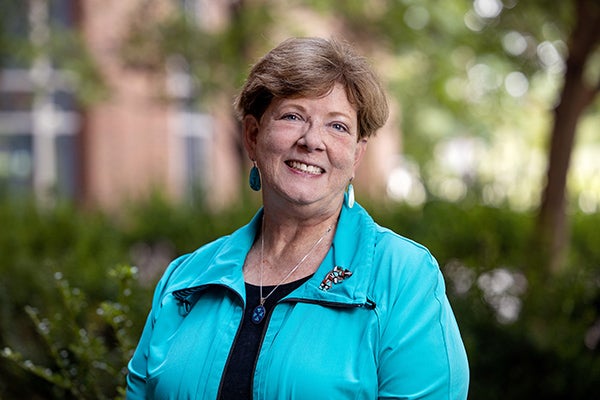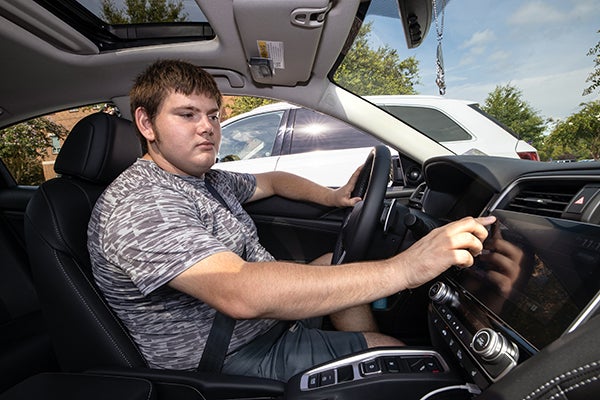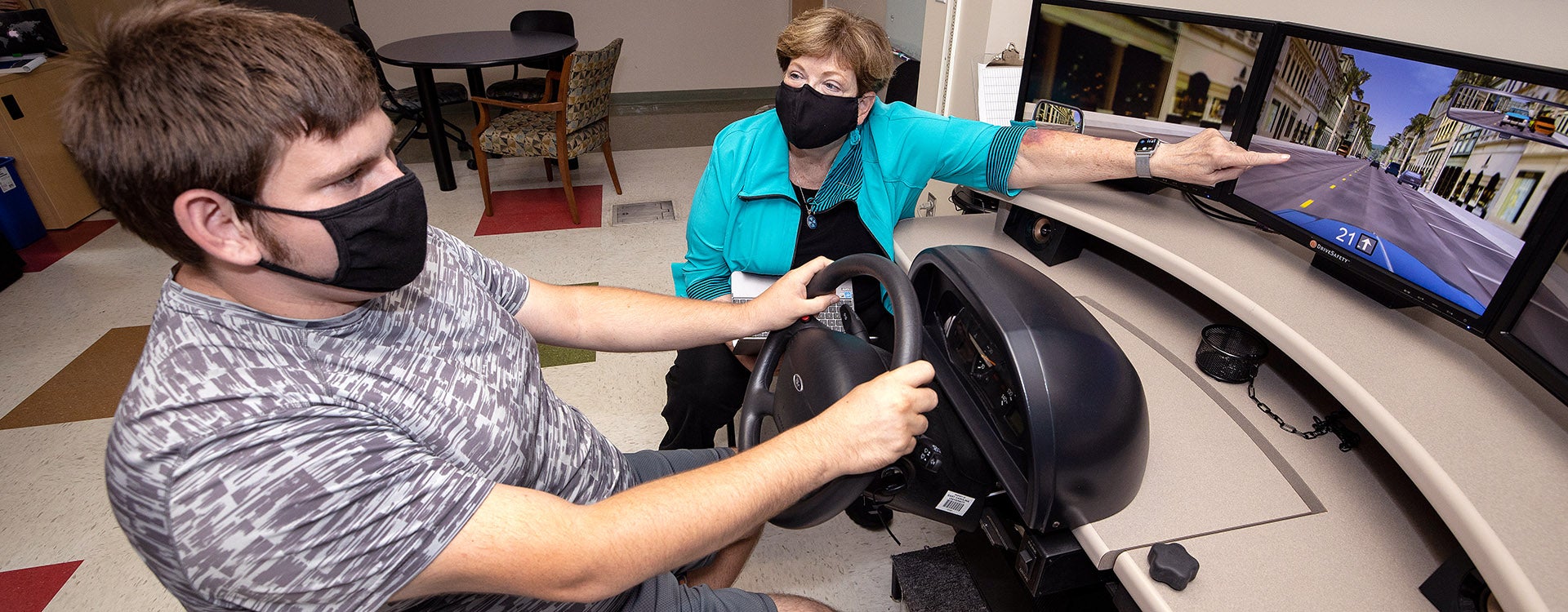DRIVING INDEPENDENCE
Dickerson wins Governor’s Award for Excellence in Public Service
For parents of teens in Dr. Anne Dickerson’s driving boot camp, there aren’t enough words to describe what she and her East Carolina University occupational therapy graduate students have given their children with autism.
Independence, freedom and confidence all come to mind.
While Dickerson’s primary research over the past 25 years has been with older drivers, five years ago she established a summer boot camp for young adults with autism spectrum disorder (ASD) for which she’s been recognized with the highest honor given to state employees.
Dickerson received the 2020 Governor’s Award for Excellence in Public Service from North Carolina Gov. Roy Cooper in a virtual ceremony Oct. 27. Dickerson was one of 13 people recognized for service and contributions that “go beyond the call of duty and make a positive difference in the lives of their fellow North Carolinians.”
“It really is a great honor,” said Dickerson, professor of occupational therapy in the College of Allied Health Sciences. “I couldn’t do it without the (ECU) students. Each student group has built on the last one with their enthusiasm and empathy and support for these kids. It’s incredible. As much as it’s an award for me, it’s for these students and these kids. I want to share this award with all these individuals.”
Occupational therapy helps ensure that people can do the things they need to do every day, “and one of those is driving,” Dickerson said. “Everybody deserves a chance.”
Inspiring possibilities
Autism spectrum disorder is a developmental disability that can cause social, communication and behavioral challenges. The learning, thinking and problem-solving abilities of people with ASD can range from gifted to severely challenged, meaning some people need a lot of help in their daily lives while others don’t, according to the Centers for Disease Control and Prevention. About 2 million people have ASD, and an estimated half million will be of driving age in the coming decade.

Dr. Anne Dickerson has received the 2020 Governor’s Award for Excellence in Public Service. She was awarded ECU’s Lifetime Achievement Award in Research and Scholarly Activity in 2018. She also serves as director of the Research for Older Adult Driver Initiative (ROADI).
A rite of passage to adulthood, driving helps teens secure their first jobs, meet friends and complete daily tasks assigned by their parents, according to Dickerson’s award nomination. Even with ride-sharing services and electric scooters, driving is essential for transitioning to college or the workforce — especially in rural areas like eastern North Carolina.
But some people with autism don’t learn to drive. Large driver’s education classes coupled with behind-the-wheel instruction with two or three people in a car are often deal breakers for completing licensing requirements.
Dickerson — inspired by her son, Eric, who has high-level autism and whom Dickerson taught to drive — saw the need, and along with former faculty member Jennifer Radloff, created the boot camp in 2015.
Each summer, eight to 12 young adults from across North Carolina invest 30-45 hours learning about community mobility and driving — all with the long-term goal of getting a driver’s license.
Before advancing to actual vehicles, participants spend time in an interactive driving simulator on ECU’s health sciences campus. The simulator teaches them how to use the steering wheel and pedals simultaneously and records scenarios like a missed stop sign or complicated intersection to help avoid future mistakes. They also learn how to navigate their community, from using GPS and reading maps to handling a flat tire. Highlights include role-playing with an ECU police officer as well as riding an ECU Transit bus.
“They not only are learning the rules of the road, but we teach them about social cues,” Dickerson said. Because individuals with autism follow rules closely, it can be difficult to anticipate or react to another driver braking or turning suddenly, or running a red light when they’re not supposed to. “We problem-solve a lot of these issues,” she said.
Beyond the nuts and bolts of driving, an integral part of camp is spending time with others who often have trouble making friends or who may be ignored or bullied at school because of their differences.
“The social part is so important,” Dickerson said.
Encouraging and motivating
Timmy Peaden of Greenville has had his license for about three years, driving himself to classes at Pitt Community College as well as working for a lawn care company and as a DoorDash deliverer.
His mother, Wanda, trusts his ability to handle different situations because of what he learned in the boot camp. “He is very independent and has his own car and can go to the places that he wants without having to get a ride from someone else, and he loves the freedom,” Peaden said. “The independence is also a big confidence booster.”
Erin Heath of Winterville said her daughters, Riley and Maggie Burton, were excited to go to camp every day. “They didn’t ever talk about things that they couldn’t do or say that they weren’t going to be able to achieve things,” she said. “They were always talking about learning new things or how they would be able to navigate through challenging things.”
Dickerson is passionate, devoted, encouraging and motivating for all the campers, Heath said.
“Dr. Dickerson has established a program that educates and empowers people to live independent lives,” she said. “As a mother who has not only watched her children struggle to gain new skills throughout many phases of their lives but watched them smile as they held their driver’s ed completion certificates, there is nothing more valuable than an exceptional teacher. Dr. Dickerson is just that. Dr. Dickerson has and will continue to change lives through her program for generations to come by the students she has empowered with an education in driving and compassion.”
Heath said she plans to send her youngest daughter, who also has autism, to camp when it’s offered again.
ECU occupational therapy graduate student Juliette Leonardo of Cape Carteret worked with campers last summer. She said it was a unique opportunity to really get to know each participant, and to learn how to motivate them to get to the next level in their driving journey.
“Driving boot camp taught me a lot about how teenagers on the autism spectrum process things, but also a lot about myself as a future occupational therapist,” said Leonardo, who is completing a 12-week clinical rotation with Vidant Medical Center and is set to graduate in May. “I think a lot of the time, people look at teenagers with disabilities and think that they will never be able to function independently, but really they just have a different way of looking at things and need someone to take the time to teach them life skills in a way that works for them and clicks.”
Dickerson served as Leonardo’s thesis adviser for her research on nighttime driving and eye tracking technology. “She spent countless hours advising me on different methods or approaches to take, different resources to use and people to talk to. I learned a lot from her about the research process and how rewarding the final outcome of a research project is,” Leonardo said. “Not only is she very intelligent and a talented researcher, but she cares very deeply for her students and for the people she helps.”

Timmy Peaden of Greenville adjusts the controls in his car.
Recent graduate Tara Baran talks regularly with Dickerson, who was her thesis adviser and is a reference in her job search. “She has an open-door policy. Especially during stressful and difficult times, it’s important to have someone support you,” Baran said. “I wouldn’t be as confident in my skills as an occupational therapist without Dr. Dickerson.”
Baran worked in the boot camp in 2018, guiding participants from the basics to more complex tasks like merging, switching lanes and safely avoiding hazards without getting nervous or upset. “It was really cool to see that growth during the week,” said Baran, who plans to work in pediatrics. “It was a great experience and I feel lucky I got to participate in it.”
Since its inception, 28 young adults have participated in the boot camps. Only the size of Dickerson’s laboratory restricts the number of participants; there’s no charge for the program. Dickerson plans to offer the program each summer and is seeking funding for campers who live outside of Greenville and can’t afford accommodations for the weeklong program.
Dickerson also is developing an online manual for occupational therapists so the program can be duplicated. “There are places that are doing pieces of it,” she said. “But only ECU is putting all the pieces together.”
